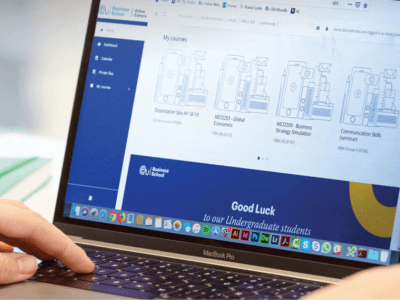In another fascinating and engaging Crafting Your Future event, Timo Buetefisch, Co-Founder and CEO at Cooltra, spoke with EU students about his experience starting and growing his company.
Cooltra is the leading two-wheel mobility solutions company in Europe. They have over 1,000 employees from 36 different nationalities. Cooltra operates in 6 countries and 35 cities and has an annual revenue of 40 million euros. They have a fleet of 17,000 vehicles and have provided 12.8 million rides since they were founded in 2006. In other words, they are an incredibly successful business.
Starting and growing a prosperous company is not easy, so we hope that these insights shared by Timo help you on your path to success.
Where to Start When Starting a Business
Cooltra was born of a personal need of Timo’s; he found that when he took his scooter to be fixed in Barcelona, there was nowhere for him to rent a temporary replacement.
Fulfilling a personal need or surmounting a challenge that you have faced personally is a common starting point for entrepreneurs. It has the advantage of giving the founder an insight into their customers’ needs. And having a personal story as to why you founded your business makes a compelling story which is helpful when pitching for investment.
If you are a budding entrepreneur, noticing the challenges or unmet needs you have could be a productive way to start thinking about the business you want to set up.
Successfully Raising Investment
It is essential to have a strong pitch when going for investment. Many founders, Timo included, start by investing their own funds into their budding business; Timo started Cooltra with 60,000 euros in capital. They’ve since raised over 70 million euros from venture capital companies, banks and private individuals.
It wasn’t until the company had been operating for nine months that Timo wrote a detailed business plan and approached investors. He pitched at an angel investors forum and found three angels willing to put in 700,000 euros to grow Cooltra.
By the time Timo gave his pitch he had scooters out for rent, customers using the service and was generating income. This gave him credibility and reassured the angels that the business would be profitable.
Timo’s advice for entrepreneurs is to ensure that you have a convincing business model and evidence of demand when you are seeking investment in your company.
Standing Out Against the Competition
Cooltra is no longer the only two-wheeled mobility provider on the block. But they are still the market leaders.
Entrepreneurs should expect to face competition. If you’re the first to launch a unique product or service, success will naturally bring competitors. Continuing to differentiate yourself is key, as is building a strong and loyal customer base.
Cooltra has approximately one million loyal customers who, despite multiple competitors creating a crowded market, do not defer to another company. Timo believes their success is largely down to being solutions oriented and focusing on providing excellent customer experience. They work to solve any challenges that arise– and they do arise, daily – as quickly as possible.
Knowing your company’s unique selling points and the aspects of your business that make you stand out, is important when it comes to maintaining your market share.
A Business Model For Growth
Cooltra is a business of two halves. They operate both B2B and B2C, meaning that they have both business and individual customers with different needs and different solutions.
Cooltra offer long-term rentals to a range of business customers including police departments and delivery companies such as Domino’s Pizza. They charge a monthly fee for the rental of a bike over a two- to three-year period.
On the other side of the business they have an app which enables individuals to rent scooters parked all over the cities in which they operate. Their data shows that the scooters are usually used for trips of 2-5km, so they have just launched their first fleet of bicycles in Barcelona to provide for the shorter journeys their customers take.

Timo is focusing his expansion on Europe. He knows the market and he knows that the southern hemisphere offers the temperate year-round climate that makes his business a success. He aims to expand to 100 European cities and to grow his fleet to five times its current size.
Cooltra’s fleet initially consisted of gas engine motorcycles. Over the past 14 years they’ve been transitioning to electric, emission-free vehicles and 56% of their fleet are now electric. Starting the business in this way enabled Timo to grow the company in a direction that accords with public concern for the environment. It also means he has a compelling story to encourage investors and customers as Cooltra continues to grow. Cities around the world are shrouded in pollution that causes respiratory diseases and even death, so working towards car-free cities is an appealing narrative and an admirable ambition.
Founded as a brick-and-mortar company, Timo has repositioned Cooltra as a technology company. This plays out in several ways: Cooltra’s team includes a growing number of developers; they own their own app, including the back-end development space; and integrating technology into their services is a primary concern. Given digitalization is rapidly spreading through every industry globally, this approach will ensure that Cooltra continues to be a relevant and competitive business.
When writing your business plan, consider the routes for growth that your company will have and prepare accordingly. Having this defined from the outset will demonstrate your ambition to investors and give you a roadmap to guide decisions as you move through the challenging early phases.
Preparing For the Market of the Future
All good entrepreneurs and CEOs should have their eyes on the future. What trends are emerging in your sector? How are customers’ needs or concerns changing? How might that shape the position of your brand or your next product?
Timo’s convinced that autonomous vehicles will become a reality, but that does not present a threat to Cooltra. As a large fleet operator, the company is prepared to transition to use their expertise to manage the autonomous fleets of the not-too-distant future.
When starting a business, it is also helpful to consider the sectors ripe for innovation. Timo suggested that health care, particularly health and technology, education, especially online and mobility are all sectors that will continue to flourish. However, he urged students not to feel limited by this, as, “Any sector can be innovated”.
Life as a CEO and Leader
Every day throws at least five different challenges in Timo’s path. Thankfully, he finds developing solutions interesting, and this is a huge part of his role as a leader.
Timo has 15 direct reports, including finance, marketing, business development and country managers. It is a high number of people for anyone to manage, but by meeting every Monday as a group and then spending half an hour with each person individually, Timo is able to make sure that they solve any issues that arise. Bringing everyone together, he said, is always interesting as they have different roles, experiences and backgrounds, and therefore different perspectives.
He takes a very careful approach to hiring, seeking “attitude not aptitude” and paying no attention to the particular university or course that a candidate has taken. Instead, he is looking at how they behave in interviews. At Cooltra there is a five-interview process that helps them make sure they hire the right people. Hiring and retaining great staff was one of the challenges Timo predicted will face Cooltra in the future.
As the founder of the company, having been at the helm for 14 years, Timo has credibility as a leader. However, leadership is not something that you are just good at, he said, it is something that you have to continue to work on and deliver every single day. And it is not easy. Communication skills are really important. They help him to navigate tough decisions and to keep his team motivated through challenges. But it is complex, and it takes continued effort to be a great leader.
Why Entrepreneurs Should Pursue Further Education
Timo emphasized the importance his MBA had on his entrepreneurial journey. The opportunity to move from his native Germany to Barcelona, to learn a new language and to gain different perspectives by developing a global network, alongside the topics covered in the program, gave him the insights, experience and confidence to launch Cooltra.
“The MBA is a very good platform to get to know many other students and especially dive into topics that you are interested in”, he said. If you have studied a specialist subject, taking an MBA will give you a 360-degree knowledge of the many facets of business you’ll need to know to be a successful founder and CEO. And studying abroad has the added advantage of preparing you to thrive in an international business market.
At EU Business School we offer a range of business programs from bachelor’s to MBA level which will prepare you to found, grow and lead successful businesses.










